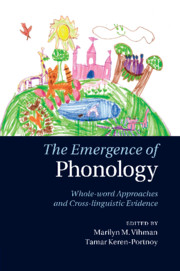Crossref Citations
This Book has been
cited by the following publications. This list is generated based on data provided by Crossref.
2014.
Phonological Development.
p.
1.
Wauquier, Sophie
2014.
The Form of Structure, the Structure of Form.
Vol. 12,
Issue. ,
p.
219.
2014.
Phonological Development.
p.
179.
2014.
Phonological Development.
p.
311.
2014.
Phonological Development.
p.
145.
Vihman, Marilyn May
DePaolis, Rory A.
and
Keren‐Portnoy, Tamar
2014.
The Role of Production in Infant Word Learning.
Language Learning,
Vol. 64,
Issue. s2,
p.
121.
2014.
Phonological Development.
p.
323.
2014.
Phonological Development.
p.
277.
Kehoe, Margaret M.
2015.
Lexical-phonological interactions in bilingual children.
First Language,
Vol. 35,
Issue. 2,
p.
93.
Kehoe, Margaret
2015.
Acquisition of velars: A whole-word approach.
Clinical Linguistics & Phonetics,
Vol. 29,
Issue. 12,
p.
873.
Vihman, Marilyn May
2015.
The Handbook of English Pronunciation.
p.
331.
Vihman, Marilyn M.
DePaolis, Rory A.
and
Keren-Portnoy, Tamar
2015.
The Cambridge Handbook of Child Language.
p.
207.
Ben-David, Avivit
and
Bat-El, Outi
2016.
Acquisition and Development of Hebrew.
Vol. 19,
Issue. ,
p.
39.
Keren-Portnoy, Tamar
and
Segal, Osnat
2016.
Acquisition and Development of Hebrew.
Vol. 19,
Issue. ,
p.
69.
VIHMAN, MARILYN
2016.
Prosodic structures and templates in bilingual phonological development.
Bilingualism: Language and Cognition,
Vol. 19,
Issue. 1,
p.
69.
Vihman, Marilyn M.
2017.
Learning words and learning sounds: Advances in language development.
British Journal of Psychology,
Vol. 108,
Issue. 1,
p.
1.
LAING, CATHERINE E.
VIHMAN, MARILYN
and
KEREN-PORTNOY, TAMAR
2017.
How salient are onomatopoeia in the early input? A prosodic analysis of infant-directed speech.
Journal of Child Language,
Vol. 44,
Issue. 5,
p.
1117.
VIHMAN, MARILYN
and
MAJORANO, MARINELLA
2017.
The role of geminates in infants' early word production and word-form recognition.
Journal of Child Language,
Vol. 44,
Issue. 1,
p.
158.
Vihman, Marilyn
2018.
The Development of Prosody in First Language Acquisition.
Vol. 23,
Issue. ,
p.
185.
Vihman, Marilyn
and
Wauquier, Sophie
2018.
Sources of Variation in First Language Acquisition.
Vol. 22,
Issue. ,
p.
27.



